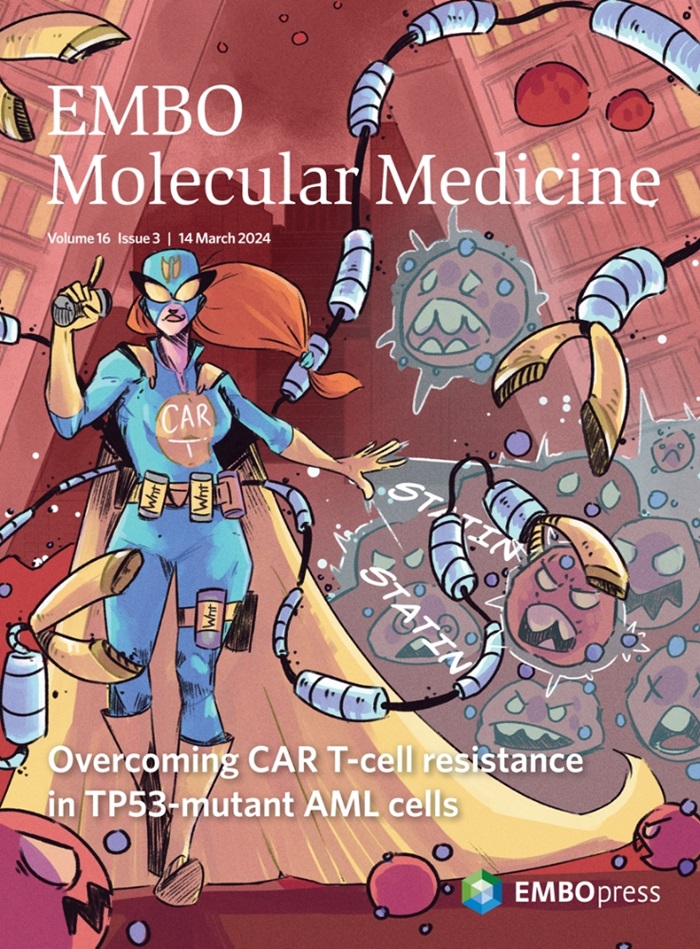LIMA1-alpha staining predicts curative intent surgery response in HPV negative head and neck cancer.
IF 9
1区 医学
Q1 MEDICINE, RESEARCH & EXPERIMENTAL
引用次数: 0
Abstract
In many solid cancer types, surgery alone could be a sufficient first therapy option for a significant number of cancer patients. However, there are currently no diagnostic solutions to identify patients who could be stratified to surgery alone. To identify a biomarker predicting cancer surgery response, candidate biomarkers were studied in a non-metastatic head and neck squamous cell carcinoma (nmHNSCC) cohort well representative of the HPV-negative patient population. LIMA1 immunohistochemistry (IHC) with specificity-validated antibodies outperformed all other biomarkers in multivariable survival analyses of patients with nmHNSCC (n = 128, HR 2.10, P = 0.006). The prognostic effect was selective to LIMA1-alpha isoform IHC detection in patients who had received surgical therapy (n = 184, HR 2.39, P > 0.001). Strikingly, our real-world validation results, using two prospectively collected cohorts (n = 15 and n = 86), demonstrate that none of the LIMA1 negative patients died of HNSCC during the follow-up. Collectively, we report here the discovery of a diagnostic LIMA1-alpha IHC assay for HPV-negative HNSCC patient stratification to surgery-only therapy. Application of LIMA1 detection in routine nmHNSCC diagnostics would revolutionize the clinical management of HNSCC patients.lima1 - α染色预测HPV阴性头颈癌的治疗意图手术反应。
在许多实体癌症类型中,对于相当数量的癌症患者来说,单独的手术可能是一个足够的第一治疗选择。然而,目前还没有诊断方案来确定哪些患者可以分层进行单独手术。为了确定预测癌症手术反应的生物标志物,研究了在非转移性头颈部鳞状细胞癌(nmHNSCC)队列中很好地代表hpv阴性患者群体的候选生物标志物。在nmHNSCC患者的多变量生存分析中,特异性验证抗体的LIMA1免疫组织化学(IHC)优于所有其他生物标志物(n = 128, HR 2.10, P = 0.006)。在接受手术治疗的患者中,lima1 - α异构体IHC检测对预后的影响是选择性的(n = 184, HR 2.39, P < 0.001)。引人注目的是,我们的现实验证结果,使用两个前瞻性收集的队列(n = 15和n = 86),表明在随访期间没有LIMA1阴性患者死于HNSCC。总的来说,我们在这里报告了一项用于hpv阴性HNSCC患者分层到仅手术治疗的诊断性lima1 - α IHC检测的发现。将LIMA1检测应用于nmHNSCC的常规诊断,将会给HNSCC患者的临床管理带来革命性的变化。
本文章由计算机程序翻译,如有差异,请以英文原文为准。
求助全文
约1分钟内获得全文
求助全文
来源期刊

EMBO Molecular Medicine
医学-医学:研究与实验
CiteScore
17.70
自引率
0.90%
发文量
105
审稿时长
4-8 weeks
期刊介绍:
EMBO Molecular Medicine is an open access journal in the field of experimental medicine, dedicated to science at the interface between clinical research and basic life sciences. In addition to human data, we welcome original studies performed in cells and/or animals provided they demonstrate human disease relevance.
To enhance and better specify our commitment to precision medicine, we have expanded the scope of EMM and call for contributions in the following fields:
Environmental health and medicine, in particular studies in the field of environmental medicine in its functional and mechanistic aspects (exposome studies, toxicology, biomarkers, modeling, and intervention).
Clinical studies and case reports - Human clinical studies providing decisive clues how to control a given disease (epidemiological, pathophysiological, therapeutic, and vaccine studies). Case reports supporting hypothesis-driven research on the disease.
Biomedical technologies - Studies that present innovative materials, tools, devices, and technologies with direct translational potential and applicability (imaging technologies, drug delivery systems, tissue engineering, and AI)
 求助内容:
求助内容: 应助结果提醒方式:
应助结果提醒方式:


